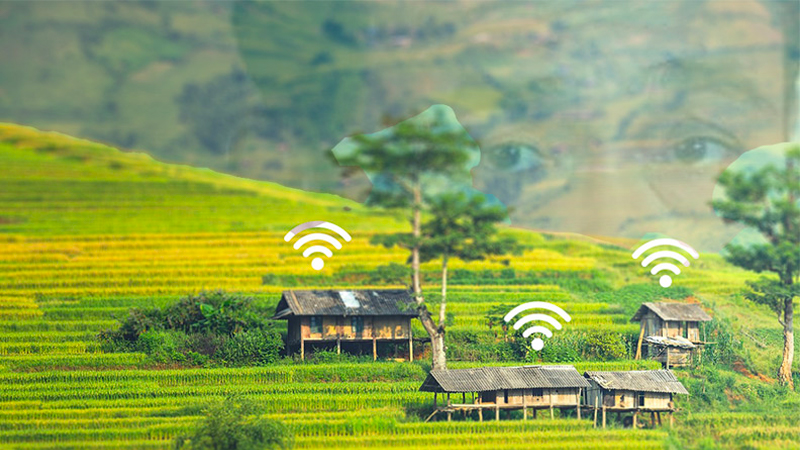Thailand’s mission to become a full-fledged broadband nation by year’s end is well underway, but corporations and the government may come out ahead of the public.
Bringing high-speed broadband internet access to 25,000 remote communities moved forward with cabinet approval yesterday of plans to give private telecoms access to publicly funded infrastructure to lower their cost of investment. It’s a plan the government says will increase digital equity, but one academic fears “puts user data at risk.”
The open-access network business model approved Tuesday is meant to encourage the major providers to expand coverage to rural areas letting them use the public fiber network, according to Chaowalit Limmaneevichitr of Digital Economy and Society Ministry.
“The villages we are targeting are really rural with not much going on,” Chaowalit told Coconuts Bangkok this morning. “Because of that, big telecommunication companies like True or AIS are not interested in investing money to build the necessary broadband infrastructure in order to provide Wi-Fi for them.”
The government’s so-called Net Pracharat project is two-fold. Firstly, the public benefit is providing each community at least one source of free Wi-Fi, with speeds of 30Mbps/10Mbps for downloads and uploads, respectively.

“The free Wi-Fi spot program has started for many months now. But one spot is not enough. If you live far away from that spot, you won’t be able to access it or have a very weak connection,” said Chaowalit, who is the secretary to the digital minister.
He gave the example of students cramming for exams late at night who may not feel comfortable leaving their homes to use that one access point.
Based on the number of complaints from people frustrated with access limitations, those problems are real.
“The internet is really slow. I am so angry at the service, it’s worse than DTAC. No photos on Twitter are loading, videos and music keeping stopping #NetPracharat,” user Aimiracle009 tweeted earlier this month.
อยากจะบอกว่ามันช้ามากๆหลังจากเลือกนายกเสร็จแล้วคือมันหงุดหงิดมากๆเน็ตแย่กว่าดีแทคอีก ไถทวิตรูปก็ไม่ค่อยขึ้นส่วนวิดีโอ ก็ดูแทบไม่ได้เวลาจะดูต้องเปิดเน็ตดีแทคเอามันหมุนตลอดเลยฟังเพลงก็สะดุดเข้าคอลกับเพื่อนก็เน็ตแดงตลอดเสียงสะดุด แล้วเวลาทำงานก็หมุนนานมากด้วย😡😡😡 #เน็ตประชารัฐ
— เรียกฉันว่าอัย (@aimiracle009) June 8, 2019
The director of Kasem Bundit University’s Institute of Digital Media Law worries there is a more sinister intent to getting everyone online.
Kanathip Thongraweewong, who is also an associate professor, said he fears the state may use the network to keep tabs on the people.
“Net Pracharat’s mission seems positive on the surface, but if you look at some of the other policies the government has recently issued, you start to wonder what their true purpose behind this project is,” he said.
The model for Net Pracharat, a reference to the type of public-private projects promoted by the military government, will allow the telecoms to piggyback on taxpayer-built systems to gain “wholesale access to network infrastructure” with the intended result of reasonable terms and prices for the public.
“We’ve installed fiber cables in many of the main roads, private companies now just have to build upon our infrastructure, which means it will be much cheaper for them,” Chaowalit said.
Thus the project’s second beneficiary, the private sector. Access would be incentivized by lending telecoms access to much of the public broadband infrastructure in order to, in theory, bring coverage to those areas at a lower cost.
To make that happen, the benefiting firms using state infrastructure must charge their rural customers less than what they charge for comparable service in developed areas such as Bangkok.
“For example, if a Bangkokian is paying THB500 a month for Wi-Fi with the speed of 10Mbps, villages in rural areas will pay less than THB500 for the same speed,” Chaowalit said, adding that he expects the work reaching all identified communities to be completed in the next month or two.
How much less was not specified, raising the question of whether it will truly be inexpensive without other pricing mandates in place.
As for the risks, Kanathip said a closer look parallel legislative and policy efforts give cause for alarm.
Even more than the controversial cybersecurity law that just came into effect, he highlighted the government’s growing efforts to control and monitor people’s online data, as well as push the kingdom toward becoming a cashless society.
All data vulnerable as new Thai cyber law comes into effect
“If a grandmother in a rural area buys something in a market, nobody will know except the people who are physically there. But if she shops online, the state will not only be able to find out exactly what she bought, from where and for how much. They will also be able to look at what she posts and browses for online,” he said. “I believe it puts user data at risk.”
He said government officials always promote only the pros of their policies and innovation without ever mentioning the cons. If they truly want citizens to grasp the full scope of each project, he said they should explain the risks, dangers and downsides as well.
Check out Net Pracharat’s multilingual website to learn more about the services.




